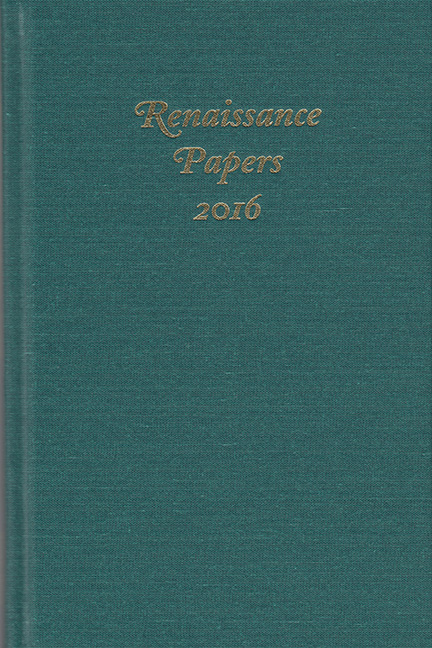Book contents
- Frontmatter
- Contents
- Renaissance Papers
- Beyond Recognition: Mutilation, Marginalia, and the Vicissitudes of Reading
- Velázquez as Reader and the Pictor Doctus in Early Modern Spanish Art
- “Out of this silence yet I picked a welcome”: The Audience in A Midsummer Night's Dream
- Uncommon Justice: The Secret Knowledge and Sagacious Judgment of Old Escalus
- Boundaries in a Globalized World: Shakespeare's Antony and Cleopatra
- Imitation, Innovation, and Imperium: The Grammar School Education of Lear's Daughters
- Violent Brothers, Deadly Antifeminism, and Social Suicide in The Revenger's Tragedy and The Duchess of Malfi
- Canon Fodder: Notes on Don Quijote
“Out of this silence yet I picked a welcome”: The Audience in A Midsummer Night's Dream
Published online by Cambridge University Press: 23 August 2019
- Frontmatter
- Contents
- Renaissance Papers
- Beyond Recognition: Mutilation, Marginalia, and the Vicissitudes of Reading
- Velázquez as Reader and the Pictor Doctus in Early Modern Spanish Art
- “Out of this silence yet I picked a welcome”: The Audience in A Midsummer Night's Dream
- Uncommon Justice: The Secret Knowledge and Sagacious Judgment of Old Escalus
- Boundaries in a Globalized World: Shakespeare's Antony and Cleopatra
- Imitation, Innovation, and Imperium: The Grammar School Education of Lear's Daughters
- Violent Brothers, Deadly Antifeminism, and Social Suicide in The Revenger's Tragedy and The Duchess of Malfi
- Canon Fodder: Notes on Don Quijote
Summary
As James Calderwood, Louis Montrose, and others have reminded us, Shakespeare's plays are frequently self-referential, calling our attention to the fact that they are acts of performance. In so doing, they remind us of their artificiality, even as we are enjoying or being moved by the “reality” that actors create on stage through the practice of their craft. The customary way of exploring this dimension of Shakespeare's stagecraft is, of course, to follow Jacques in As You Like It by using the theatrical metaphor to describe our behavior in the world outside the theater. If the stage is a kind of world, then “All the world's a stage,” and, as the melancholy Jacques tells us, the traditional “seven ages” of a human life become, were we to apply to our own experience Jacques’ cognitive framework, “seven parts,” each with its own characteristic costume, voice, and movement (AYLI, 2.7.139– 66), and each, as Hamlet puts it, “actions that a man might play” (1.2.84–85).
But this way of thinking about the theatricality of life as analogous to the artificiality of theater preserves basic distinctions between the stage and the world, between art and life, between actors and audience. The prologue in Henry V reminds us, however, that the experience of theater is not well characterized simply as an audience's passively observing a group of actors create for that audience the illusion of reality, but instead is a collaborative experience in which the audience, along with the actors, has an active role to play. The prologue—a metadramatic role if there ever was one— begs “pardon” for the audacity of the efforts of those “flat unraised spirits” to “ cram / Within this wooden O the very casques / That did affright the air at Agincourt.” They clearly cannot do that, but must instead beg the audience to “let us, ciphers to this great accompt, / On your imaginary forces work”:
Piece out our imperfections with your thoughts;
Into a thousand parts divide one man
… . .
Think when we talk of horses, that you see them
Printing their proud hoofs i’ the receiving earth;
For ‘tis your thoughts that now must deck our kings,
Carry them here and there; jumping o'er times,
Turning the accomplishment of many years
Into an hour-glass.
- Type
- Chapter
- Information
- Renaissance Papers 2016 , pp. 31 - 48Publisher: Boydell & BrewerPrint publication year: 2017

